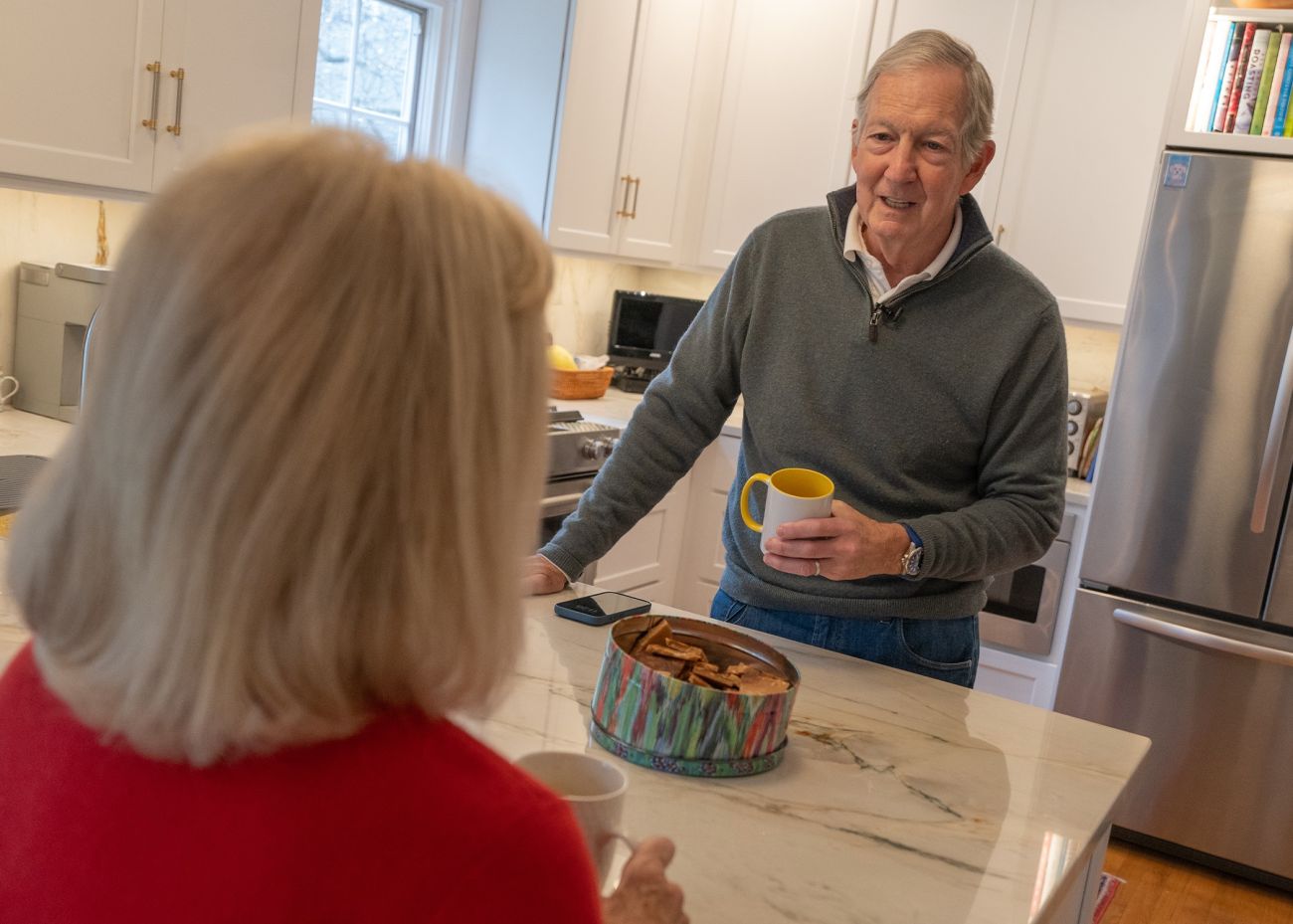After his 14 years of cancer treatment, and with few options left, CAR T-cell therapy put Chris Vogelsang's lymphoma into remission
- Personalized cancer treatment offers many patients hope for long-term remission
- 'A massive paradigm change of how we view and think of cancers'
- Roswell Park GMP Engineering & Cell Manufacturing Facility among largest in U.S.
NOTE FOR MEDIA: Video, photos and additional resources available here.
BUFFALO, N.Y. — Every day, 500 Americans are diagnosed with blood cancer, a condition that continues to rise nationwide. However, CAR T-cell therapy, an emerging personalized cancer treatment, is offering patients new hope for the possibility of long-term remission. Roswell Park Comprehensive Cancer Center is at the forefront of this new approach, with one of the largest research and manufacturing facilities in the country dedicated to improving and expanding this type of cancer treatment.
Fourteen years after he was first diagnosed with an aggressive form of lymphoma, 70-year-old Chris Vogelsang knew his cancer could return. Even though he underwent several rounds and types of treatments, including a stem cell transplant, his cancer returned twice. “My energy level was terrible. I was losing weight and had night sweats,” said Vogelsang. “It turned out that I was 90 percent involved with lymphoma cells in my bone marrow, which is pretty significant. I asked, ‘What do I have to do to get through it so I can get on with my life?’”
In 2022, his care team at Roswell Park Comprehensive Cancer Center presented CAR T-cell therapy as an option.
“As is oftentimes the case with these sometimes very stubborn and refractory types of cancer, the options became increasingly limited,” said Renier Brentjens, MD, PhD, Deputy Director and Chair of Medicine for the Roswell Park Comprehensive Cancer Center. “CAR T-cell therapy is a massive paradigm change of how we view and think of cancers and how we treat those cancers.”
Dr. Brentjens is one of the developers of CAR T-cell therapy, and has built a team of leading scientists, engineers, oncologists and nurses dedicated to advancing these treatments, improving their safety and efficacy, and making them more widely available.
“When I see patients in the clinic, I ask myself, ‘What do I have available that can cure them of their disease?’” said Marco Davila, MD, PhD, Senior Vice President and Associate Director for Translational Research at Roswell Park. “These patients have typically gone through a lot, and the upside of CAR T-cell therapy is that they can potentially get cured and go back to their lives as a father, a mother, a student—and that, to me, is just amazing.”
CAR T-cell therapy involves extracting T cells, a type of immune cells, from a patient’s blood and then taking them into a specialized lab. From there, scientists engineer the cells to recognize and kill cancer cells. The cells are then duplicated by the millions and replaced in the patient's body through an intravenous (IV) infusion.
The cells are processed in Roswell Park’s newly expanded Good Manufacturing Practice Engineering & Cell Manufacturing Facility (GEM), one of the largest facilities of its kind in the United States. It contains 20 sterile rooms across two buildings, marking a transformative step for cancer research and treatment.
“This facility helps to speed up the process, with fewer obstacles in terms of getting these cells produced and getting them into patients,” said Dr. Davila. “Our goal is to reach a day soon where a patient with any type of cancer can have an investigational cell and gene therapy available directly.”
The results of CAR T-cell therapy so far have been highly promising, with more than half of lymphoma patients achieving remission, and in certain types of leukemia, the remission rate reaching an impressive 90 percent. Vogelsang’s scans have not shown signs of cancer in his system since March 2023. CAR T-cell therapy has granted him valuable years to enjoy with his wife, Karen, and their growing family, which will soon include 10 grandchildren. Chris has also been able to return to the tennis courts, where he plays weekly with friends.
“I feel great, and I'm back to the life that I knew before,” said Chris. “To have doctors and scientists who can develop therapies is beyond words. There are people who will walk into Roswell Park today and get a diagnosis. If they know CAR T-cell therapy is available for their cancer and they know that the results have been great, it offers them hope, along with their families and friends.”
As of now, CAR T-cell therapy is FDA-approved only for certain types of blood cancer, but scientists hope that it will one day treat solid tumor cancers as well. To learn more about the unique resources available at the only National Cancer Institute-designated comprehensive cancer center in Upstate New York, as well as the capabilities and expertise housed within the Roswell Park GMP Engineering & Cell Manufacturing Facility (GEM), visit roswellpark.org/gmp.
###
From the world’s first chemotherapy research to the PSA prostate cancer biomarker, Roswell Park Comprehensive Cancer Center generates innovations that shape how cancer is detected, treated and prevented worldwide. Driven to eliminate cancer’s grip on humanity, the Roswell Park team of 4,000 makes compassionate, patient-centered cancer care and services accessible across New York State and beyond. Founded in 1898, Roswell Park was among the first three cancer centers nationwide to become a National Cancer Institute-designated comprehensive cancer center and is the only one to hold this designation in Upstate New York. To learn more about Roswell Park Comprehensive Cancer Center and the Roswell Park Care Network, visit www.roswellpark.org, call 1-800-ROSWELL (1-800-767-9355) or email ASKRoswell@RoswellPark.org.
Annie Deck-Miller, Director of Public Relations
716-845-8593; annie.deck-miller@roswellpark.org
